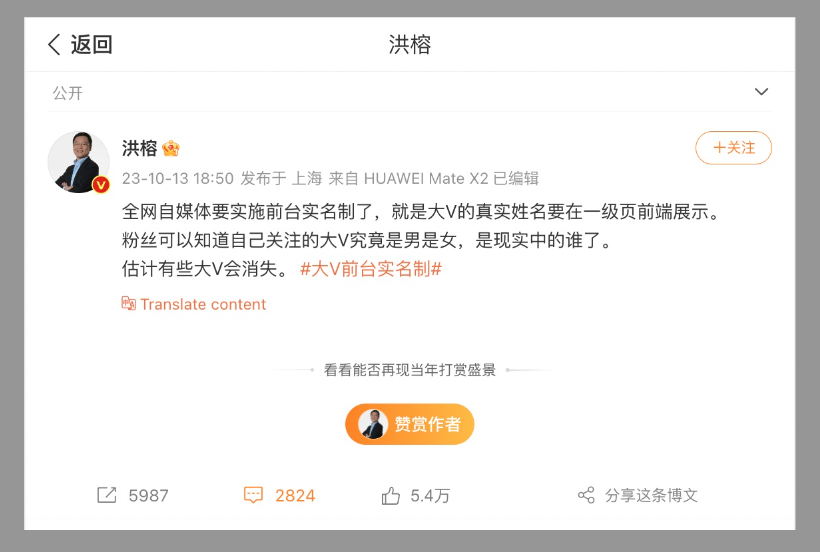
This month, a new internet regulatory measure could be on the horizon requiring all influential self-media (自媒体) accounts in China — referring to more grassroots social media accounts generally operated by individuals — to publicly display the identities of the people behind them. Such a public real-name system (实名制), some fear, could have a chilling effect on one of the country’s more vibrant information spaces, prompting some accounts to cease operating and others to self-censor out of fear of bullying and online harassment.
Rumors of the new requirement were first mentioned in a post to Weibo on October 13 by well-known Chinese investor Hong Rong (洪榕), who wrote: “A front-end real-name registration system is going to be implemented across the entire self-media landscape [in China]. This means the real names behind Big V accounts are going to be displayed on the front of the first level page. Fans will be able to know whether the Big V they follow is a man or a woman, and who they are in actuality. It is probable that some Big Vs will disappear [as a result].”

The rumor immediately prompted fevered discussion online in China, and Hong Rong followed the next day by reporting that the new measure would impact accounts with at least one million followers, exposing a wide range of influencers and key opinion leaders (KOLs) across social media platforms and livestreaming sites.
The news was also reported by a range of outlets in and outside China this week, including Guangzhou’s Southern Metropolis Daily, and Hong Kong’s HK01 — though without official confirmation. A representative at Weibo told the Southern Metropolis Daily that they “have not yet received a notice, and do not know the details.” They did not deny the measures were on the horizon, however, and even added that “the upfront real-name [system] will at this time be mainly for self-media accounts.”
One week later, on October 19, Weibo’s CEO used his personal account to confirm the rumors. “Normal web-surfers,” he wrote, would not have to display their real names publicly. Only those with “media influence” would be targeted — and while the threshold for “media influence” would be set at one million followers for now, this might extend to half a million in the future.
Curbing Cyberspace Chaos?
A related report on the Netease Chinese news portal asked in the headline whether “the era of the great open box” (大开盒时代) had arrived. For its part, Global Times English, run by the CCP’s official People’s Daily celebrated the still unconfirmed measures, saying that they would “curb cyberspace chaos.”
China’s Cyberspace Administration (CAC) has been tightening the screws on “self-media” for years. In July, the CAC issued 13 new rules to strengthen the oversight of individual user accounts. These included measures to manually review registered accounts that contain references to official organs and requiring accounts dealing with areas such as finance, education, healthcare, and the law to be “strictly verified.” On the surface, the rules might sound fair, but they also ensure those operating self-media accounts covering sensitive areas are within Party-controlled professional regimes and can be trusted politically to toe the official line.
China’s Cyberspace Administration (CAC) has been tightening the screws on “self-media” for years.
Internet regulators have been pushing mandatory real-name registration on microblogs and forums since 2015. At the time, however, users were assured that they could still post pseudonymously — a system billed as “real names backstage, voluntary upfront” (後台實名、前臺自願).
The move to disclose posters’ identities backstage and onstage is causing panic among some pseudonymous users, who fear it could disrupt their offline lives and even lead to violence against them. Doubts about the measure are not confined to accounts that espouse controversial views, either: patriotic netizen Imperial Bar (帝吧官微) called it “a gift to cyberbullies.” CEO Wang, however, has an elegant solution for big accounts covering politics or current affairs: delete your followers to keep them under one million, or change focus to something less sensitive.
“It’s not too late to become a food blogger,” he encouraged users.




















